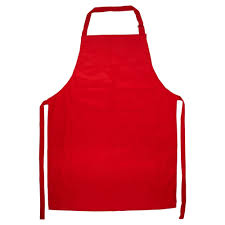apron
英 [ˈeɪ.prən]
美 [ˈeɪ.prən]
- n. 围裙;[航] 停机坪;舞台口
- vt. 着围裙于;围绕
- n. (Apron)人名;(俄)阿普龙
使用频率:

记忆方法
Apron:阿婆用。阿婆给我们做饭的时候用的----围裙。
(记)a+pron(谐音:仆人)联想:一个仆人经常穿的东西
(记)a+pron(谐音:仆人)联想:一个仆人经常穿的东西
中文词源
apron 围裙
来自短语a napron 错分为an apron. 古英语napron, 布,同map, mop.
英语词源
- apron
-
apron: [14] As in the case of adder, umpire, and many others, apron arose from a mistaken analysis of the combination ‘indefinite article + noun’. The original Middle English word was napron, but as early as the 15th century a napron had turned into an apron. Napron itself had been borrowed from Old French naperon, a derivative of nape ‘cloth’ (source of English napery and napkin); and nape came from Latin mappa ‘napkin, towel’ (source of English map).
=> map, mat, napkin - apron (n.)
- mid-15c., faulty separation (as also in adder, umpire) of a napron (c. 1300), from Old French naperon "small table-cloth," diminutive of nappe "cloth," from Latin mappa "napkin." Napron was still in use as recently as late 16c. The shift of Latin -m- to -n- was a tendency in Old French (conter from computare, printemps from primum, natte "mat, matting," from matta). Symbolic of "wife's business" from 1610s. Apron-string tenure was in reference to property held in virtue of one's wife, or during her lifetime only.
Even at his age, he ought not to be always tied to his mother's apron string. [Anne Brontë, "The Tenant of Wildfell Hall," 1848]
权威例句
- 1. He was wearing, astonishingly, a frilly pink apron over shirt and trousers.
- 他穿得很奇怪,衬衫和裤子外面套着件镶褶边的粉红围裙。
- 2. The cook's apron covered her middle.
- 厨用围裙裹着她的腰部。
- 3. She wiped her floury hands on her apron.
- 她在围裙上擦了擦沾满面粉的双手。
- 4. We were waited on by a pretty girl in a pink apron.
- 招待我们的是一位穿粉红色围裙的漂亮姑娘.
- 5. She accidentally splashed oil over her apron while cooking lunch.
- 做午饭时,她不小心把围裙溅上了油.
